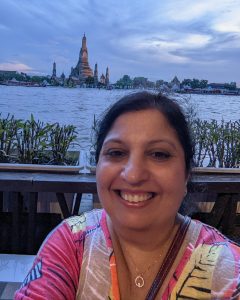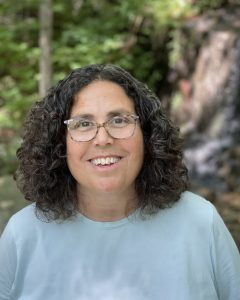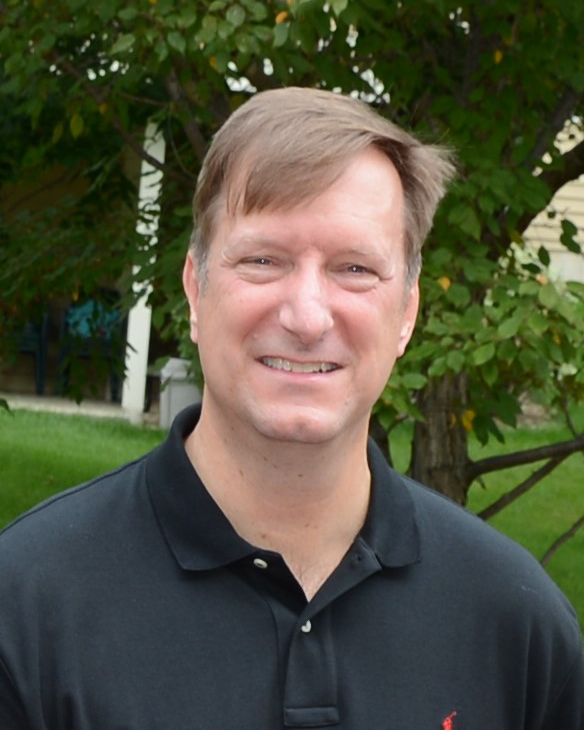By the time Kalpana Kanal, PhD, rotates off her ABR Trustee duties in October, she will have started board appointments with the American Association for Physicists in Medicine and the Commission on Accreditation of Medical Physics Education Programs.
However, she says that the work will not fill the gap created by the end of her days as a Trustee, which she estimates requires 20 to 30 travel days a year and considerable time in remote meetings.
“There’s going to be a big gap in my schedule,” said Dr. Kanal, who also volunteers for the American College of Radiology and other associations and societies. “In that respect, things will be a little bit calmer. Even though I recently become a board member for the two other organizations, I think they are not as intense because the ABR is exam focused and those are organization focused.”

Dr. Kanal has worked in the department of radiology at the University of Washington since 2000 and is professor and director of the diagnostic physics section as well as program director for the imaging physics residency program.
A Trustee since 2017, Dr. Kanal has been an ABR volunteer for 15 years. She started as a committee member for what she said was described to her as “the exam of the future,” the Diagnostic Radiology Qualifying (Core) Exam. She became chair of the core physics committee and was eventually approached by former ABR volunteer and associate executive director Donald Frey, PhD, to gauge her interest in becoming a Trustee for diagnostic medical physics.
“I definitely had to talk to my then-chairman to make sure that he was OK with me being out of the office so much,” Dr. Kanal said. “Once he said yes, I said, ‘OK, I’ll give it a shot.’”
One important Trustee duty is working with Initial and Continuing Certification committees from their specialties. Dr. Kanal also has served as chair of the Medical Physics Continuing Certification Advisory Committee.
She enjoys the results she sees from teaming with question writers and oral examiners.
“I think that in all the volunteering I have done with different organizations, I find the ABR the most fulfilling, because you’re seeing the direct impact of what you’re doing for exams,” Dr. Kanal said.
Exam content became even more relevant to her when she established the residency program in 2023. Working with trainees brings her volunteer duties full circle.
“I had my first resident graduate about a month and a half ago,” Dr. Kanal said in August. “So (medical physics qualifying exams) Part 1 and Part 2 have become more significant to me because I have people going through it.”
As chair of the Medical Physics Qualifying Exam Committee, Sam Brady, PhD, works closely with Dr. Kanal. He credits her involvement for ensuring that content is fair and clinically applicable.
“Dr. Kanal’s unwavering commitment to the ABR mission is evident in her tireless efforts to ensure the highest quality and relevance of our exam content,” Dr. Brady said. “Her leadership, expertise, and collaborative spirit have made her an integral part of our committee’s success. To say that Dr. Kanal is essential to our work is an understatement.”
The medical physics group is small, with three Trustees (including Matthew Podgorsak, PhD, and Jennifer Stickel, PhD) and one associate executive director, Geoffrey Ibbott, PhD. During Board meetings, they’re often in the room with physician representatives from diagnostic radiology, interventional radiology, and radiation oncology. As the holder of a PhD, Dr. Kanal admits that it took time to find her voice during those meetings.
“It can be very overwhelming to put your opinions forward and speak up and feel comfortable in front of all these physicians,” she said. “Once you get over that hurdle, these are all people just like us, and they’re wonderful. There are a lot of friendships formed.”
Dr. Podgorsak, who also serves as the BOT chair, said Dr. Kanal embodies the spirit of teamwork that helps the group thrive.
“She was always one of the first to volunteer for new opportunities and assignments,” he said. “I don’t think she has the word ‘No’ in her vocabulary when it comes to responding to professional requests.”
Dr. Kanal said she hopes to stay around the ABR as an oral examiner, but she realizes that assignment won’t provide the same camaraderie and teamwork as being a committee chair or Trustee. Still, her memories of being a volunteer for 15 years will be cherished.
“I really want to, from the bottom of my heart, thank the ABR staff, the president, the BOG, the BOT, for really making this such a fruitful and wonderful experience for me,” she said. “You become your own little family, the physics family, and you are in this big family, the ABR family. I’ll miss that the most.”
When asked what he thinks of rotating off his ABR Trustee spot after two terms and eight years this October, Brian Davis, MD, PhD, turned to the world of music and movies for a reply.
“Well, what is the song? ‘Breaking Up Is Hard to Do.’ That’s one,” he said. “Then there’s the line from ‘A League of Their Own.’ ‘There’s no crying in baseball.’ There’s no crying in rotating off the ABR, either. You have to bring in new people.”
Dr. Davis is one of four Trustees who will be ending their terms at the conclusion of the fall board meeting. A radiation oncologist, he said he didn’t often think about being offered a spot on the Board of Trustees (BOT) even as he worked his way up from committee assignments.
“I never had aspirations or expectations to move up the ladder within the ABR,” he said. “I just thought that I would do the work. If something comes of it, that’s great. If not, I’ve made my contribution.”
His contributions include 23 years of volunteering for the ABR. He started as an oral examiner in 2002 when pressed into service after one of his colleagues suffered a knee injury and was unable to participate.
It was a quick turnaround and the beginning of many years serving his specialty by ensuring that candidates are qualified to practice independently.
“I was asked and I really hadn’t done anything for the ABR up until that point,” Dr. Davis said. “I thought it was a great experience, professionally, by helping people and learning from other examiners.”
Dr. Davis has seen the oral examiner role evolve, most notably when the process went remote four years ago. He believes the exam is fair to candidates, especially because multiple examiners have the chance to weigh in on their performances.
“I think we’ve worked through the years to see that the examiners are fair and well-versed but also are not outliers in terms of their pass rates,” he said.
As the ABR’s associate executive director for radiation oncology, Michael Yunes, MD, has had the opportunity to work with Dr. Davis for the past two and a half years. Their collaboration has gone beyond BOT tasks, including presentations to associations and societies. Dr. Yunes said Dr. Davis has excelled in the role.
“It has been a pleasure and true honor to get to know Brian as a person, professional, collaborator, and often a sounding board for the many difficult decisions that the Board of Trustees debates on behalf of the ABR,” he said. “He has been a consummate professional, placing the best interests of the ABR at the lead of any discussion or presentations. It has been my pleasure to work with him, and I consider him a very good friend.”
Dr. Davis’ original career plan was to become an engineer. He enjoyed math and science in high school and college. He worked for a while in the nuclear power field before a slip on the ice in Illinois caused him to rethink his plans.
The mishap sent him to physicians who couldn’t diagnose the issue. He eventually went to an orthopedist who discovered he had sustained a herniated disk. The frustrating process convinced him that he should make a career switch.
“I don’t know how the other doctors missed it,” Dr. Davis said. “I decided to make the change to medicine.”
Becoming a physician has proven to be the right choice. He finished his residency at Memorial Sloan-Kettering Cancer Center in 1996 and earned ABR certification the following year.
Dr. Davis has been affiliated with the Mayo Clinic in Rochester, Minnesota for almost 30 years and serves as radiation oncology professor at the institution’s college of medicine and science and as an attending physician. Seeing patients, doing procedures, and working with trainees gives him great satisfaction. He sees many productive years ahead.
“This continues to be a very fulfilling career,” he said. “We’ll keep going.”
Eight years as an ABR Trustee started during a walk in the park for Anne Covey, MD.
Dr. Covey’s invitation to be nominated was extended by John Kaufman, MD, MS. Dr. Kaufman was an interventional radiology (IR) Trustee at the time and is now ABR President-elect. He called his colleague while she was strolling in Central Park to gauge her interest in the role.
“He said, ‘I was wondering if you might be interested in being nominated as (an IR/DR) Trustee,’” she said. “He was very clear and said, ‘There are no guarantees if you’re nominated that you’ll be selected, but I think you’d be good at this.’”

Dr. Covey was intrigued by the idea. This was in 2017, and she already had been an ABR volunteer for 10 years. But before she moved forward, she needed more information.
“I told him, ‘If I’m making this commitment, I want to make sure that I have the time and bandwidth,’” Dr. Covey said. “But what I really meant was, ‘What the heck is an ABR Trustee?’ I immediately went to my office and started learning about what the Board of Trustees does. Then I called him back and said I would be honored to be considered.”
After being named to the post, Dr. Covey took a low-key approach in her early days. Part of that was the respect she had for her experienced colleagues, who helped guide her through the onboarding process.
“During my first year, the other (IR/DR) Trustees were John Kaufman and Jim Spies,” she said. “They really guided me and eased me into the role. And I was wise enough to keep my mouth shut and listen for the first six months or so. That was really important.”
Early in her career, Dr. Covey worked at the Indiana University Department of Radiology, where she met Val Jackson, MD, who was an ABR volunteer at the time. Dr. Jackson went on to become the organization’s executive director from 2014-2020.
Dr. Covey credits her colleague for sparking her interest in becoming a volunteer. Dr. Jackson said she’s glad her friend took interest.
“She worked incredibly hard and was always reliable, professional, and pleasant, even in times of stress,” Dr. Jackson said. “Because I had always enjoyed my volunteer activities with the ABR, I encouraged her to get involved. She does a great job in everything she takes on, so I knew she would be a great volunteer and Trustee. I am grateful that I got to work with her at IU and the ABR and that she is a wonderful friend.”
Dr. Covey is an attending member at Memorial Sloan Kettering Cancer Center and a professor of radiology at Weill Cornell Medical Center. She began her volunteer career with the ABR as an oral board examiner for diagnostic radiology and subsequently for the interventional radiology CAQ. She has also been a question writer for several committees.
Balancing work and volunteer time is a challenge. But she finds the work with the ABR valuable because of the comradery it creates. Committee members often have some of their most important conversations outside their meeting rooms.
“I think all of us are busier and busier with our clinical work, which in some ways would seem to leave less time for volunteer activities. But the importance of the work and the collegiality with other volunteers and staff has paradoxically really been an antidote to burnout for me.”
Dr. Covey said working on committees gave her the chance to discover elements of medicine that weren’t familiar. Her specialty is interventional radiology.
“There are a lot of things that I don’t necessarily do that I learned about from working on different committees,” she said. “It’s been so rewarding and educational.”
As a Trustee, she finds herself working with an even wider group, including diagnostic radiologists, medical physicists, and radiation oncologists, all of whom are highly influential in their fields.
She believes that serving the ABR has been a two-way street: She has contributed to her field and seen increased professional opportunities.
“Many of the people who volunteer for the ABR are the luminaries in their fields,” Dr. Covey said. “I think it likely that many opportunities that I’ve had have been a result of having that stamp of approval and being vetted by the ABR. That gives you a lot of legitimacy.”
Four Trustees, including Dr Covey, are completing their terms this October at the ABR fall board meeting. Giving up her spot doesn’t mean that she’s reached the end of her tour. Just as when she started almost 20 years ago, she’s enthused about filling in wherever the organization needs her.
“I don’t care about the capacity,” Dr. Covey said. “I’ll be an examiner. I’ll write on a committee. I’ll do whatever the ABR needs me to do.”



